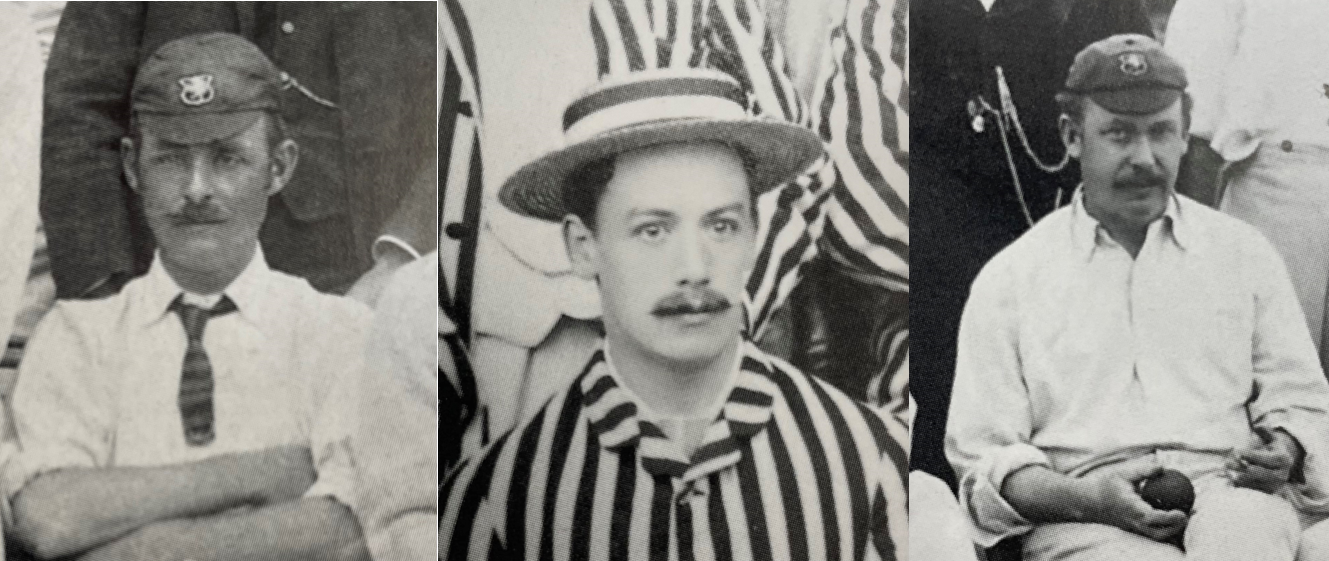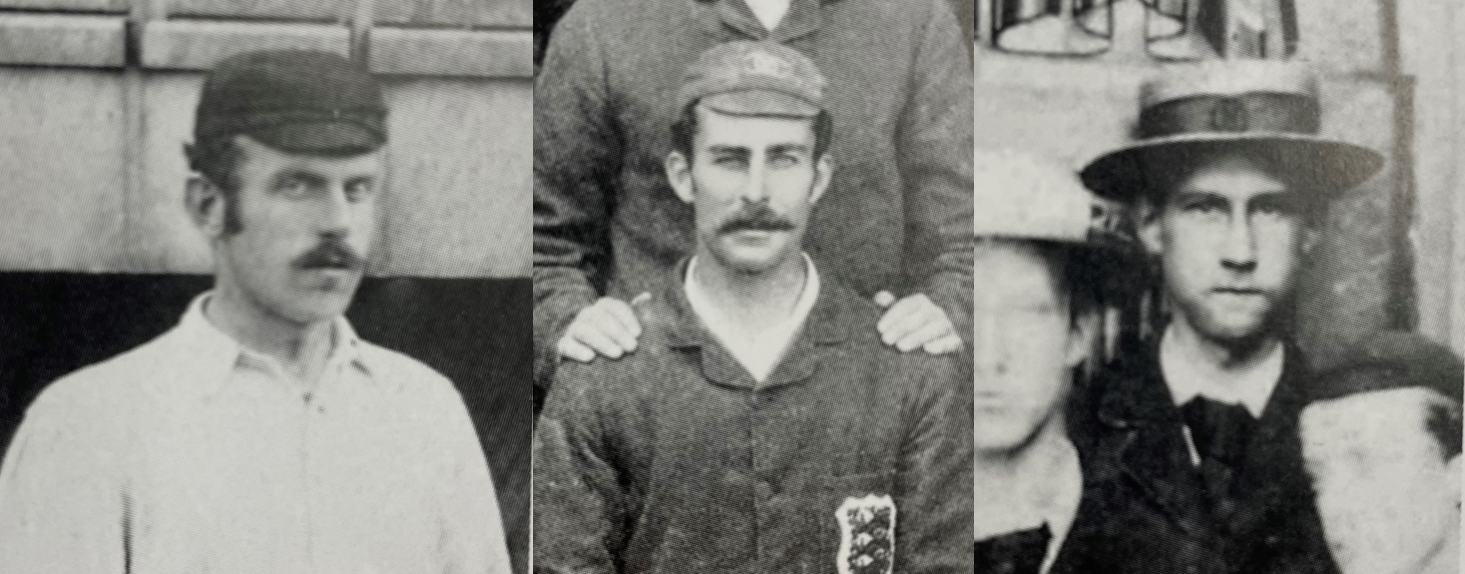
Those who came before: A look at Somerset’s First Class players – Part Three
When Josh Thomas walked out to bat on his full Somerset debut against Essex, he became the 698th player to represent the Club in First Class Cricket.
With this in mind, we thought we would take a look back at those who have come before.
Over the next few weeks, we’ll be taking a look back at some of the previous 697 players who have worn the Wyvern (or donned the Dragon) in red ball cricket.
#23 – Stephen Cox Newton
Born in Nailsea in 1853, Newton moved to St Helier following the death of his mother when he was still relatively young.
Educated at Victoria College, Jersey, Newton captained their First XI for three years. He went on to graduate from Corpus Christi, Cambridge, in 1876 having earned his blue. After Cambridge, he became a schoolmaster at Highgate School in 1876 before becoming headmaster and proprietor of Louden House School which he ran from his own home.
He was Captain of Somerset from 1882 to 1884 and his 16 First Class appearances for Somerset yielded 737 runs with a top score of 80.
He also played First Class cricket for Middlesex and MCC.
He passed away at the age of 63 in 1916 at a nursing home in Ipswich.
#24 – Frederick William Hotham
Hotham was born in Bath in 1844 and was educated at Rossall Scholl, Eton College and Queen’s College, Oxford. After university he became a schoolmaster at Elstree. He also featured for the famous Wanderers Football Club on a number of occasions.
He played one First Class match for Somerset in 1882, scoring 10 runs. He also played a First Class fixture for MCC.
From 1888 until the time of his death he was the rector of Cricket Malherbie as well as acting as chaplain of the Chard Union Workhouse.
He died of a heart attack in bed at home at the age 64 in 1908.
#25 – Lyonel D’Arcy Hildyard
Born in Lancashire in 1861, Hildyard attended Birmingham Grammar School. He moved to the South West and became an assistant schoolmaster at St Andrews College, Chardstock. A keen musician, he was an accomplished harp, viola and organ player. At St Andrews, he represented the college in both rugby and cricket.
In 1880 at the age of 19 he featured for Somerset in a non First Class match against Sussex.
After leaving his position ta St Andrews he attended Magdalen College, Oxford, earning his blue in cricket.
Between 1882 and 1883 he played in seven First Class matches for Somerset, scoring 211 runs with a best of 59 not out. He also played First Class cricket for Lancashire and Oxford University.
In 1908 he became the rector of St Peter’s Church near Hull and held the position until his death at the age of 70 in 1931. An oak portal in the vestry is dedicated to his memory.
#26 – William Nichols Roe
‘Bill@ Roe was born in Closworth in 1861 and attended the Clergy Orphan School, Canterbury before moving on to Magdalene College, Cambridge.
Between 1883 and 1900 he taught at Elstree School, a feeder school for Eton and Harrow, before setting up a new preparatory school near Harrow.
Between 1882 and 1899 he played in 66 First Class matches for Somerset, scoring 2404 runs with a top score of 132. He also claimed 21 wickets with a best of three for 50.
He passed away at the age of 76 in a Marylebone nursing home in 1937.
#27 – Edward Western
The circumstances of his birth were shrouded in mystery until it was recently established that he was born in Poulton on May 12th 1845. He was raised by two elderly spinsters from Brislington, who took in abandoned children and orphans, offering them a home and an education.
Further mystery surrounds how a child from an impoverished background was privately educated and who funded his time at Fullands School in Taunton, where he obtained a double first-class education certificate.
He played for The Gentlemen of Somerset against The Gentlemen of Devon, a game which saw the formation of Somerset County Cricket Club. In addition to that he was asked to become the newly-formed club’s first secretary, a position he held until SOmerset lost First Class status after the 1885 season.
His two Firsct Class matches for Somerset saw him score six runs.
He became a private tutor in Western-super-Mare before being appointed as headmaster of Langport Grammar School. After leaving Langport in 1892 he taught in Ilfracombe before setting up a private school in Alcombe, Minehead.
He remained in Minehead with his wife and was often to be found on the course at Minehead and West Somerset Golf Club where he played off a single-figure handicap. He passed away in the town at the age of 74 in 1919.
#28 Walter William Giffard Tate
Tate was born in Axminster in 1863 and was educated at the Clergy Orphan School in Canterbury following the death of his father when he was just three years old.
In 1882 he made his only First Class appearance for Somerset, scoring 19 runs.
The family emigrated to Australia and by 1892 he had joined the Colonial Sugar refining Company as a salesman and an accountant. He later became the secretary to the National Roads Association and then the secretary of the South Australia Roads Construction Company.
He fathered two sons. The eldest was killed in the first World War and the youngest died in the Second World War.
Tate died at the age of 83 in 1946.
#29 – William Whicher Cookson
Born in India in 1862, Cookson’s family returned to England when his father, a Major General, retired to Sampford Arundel near Wellington.
He was sent to Clifton College in 1877 where he was awarded a place as a gentleman cadet at the Royal Academy in Woolwich before receiving his Royal Artillery commission.
Having already played cricket for the Royal Artillery, he was invited to play for Somerset against MCC at Taunton in 1882. It was to be his only First Class appearance. He scored eight runs.
His entire military career was spent in the North West Frontier and in 1900 he had risen to the rank of Major. He retired from the Army in 1908.
He moved to Winscombe in 1915, where he died in 1922 at the age of 60.
#30 – Alfred Henry Evans
Evans was born in Madras in 1858, but the family relocated to Bath when he was still a child. He was sent to Rossall School where he played for the First XI before attending Clifton College where he captained the cricket team in his final year. He later went to Oriel College, Oxford where he gained his blue. He also gained a blue in rugby. Indeed, he was due to represent his country against Ireland but the rugby union international match was cancelled due to fog.
After graduating from Oxford, he was offered the position of assistant master at Winchester College where he taught for six years.
He played cricket for an England XI, and his six First Class matches for Somerset saw him accumulate 212 runs with a top score of 59 not out. He also claimed 26 wickets with a best of six for 75. He would have played many more games for the county but due to his teaching career, his appearances were limited to the summer break.
In 1888 he became the headmaster of of Horris Hill Preparatory School.
He died at the age of 75 in 1934 after collapsing during a round of golf in Saunton, Devon.
#31 – Hamilton Ross
‘Hammy’ Ross was born in Grenada in 1849 but his connection with Somerset began when he was educated at Hermitage School, Bath.
He is widely believed to have been the first player of Afro-Caribbean decent to play First Class cricket.
He played for Somerset between 1878 and 1891 and featured in five First Class matches for the County, scoring 72 runs.
Trained as a barrister, he practiced in Bath and London.
He passed away at the age of 88 in Grenada in 1938.
#32 – Albert Lavington Porter
The son of a prosperous Australian export merchant, Porter was born in Croydon in 1864.
He graduated from Trinity College, Cambridge in 1886 with the reputation as a fine rower rather than as a cricketer.
During his time at Cambridge his family relocated to a residence near Bath, and whilst at university he featured in two First Class matches for Somerset, scoring 12 runs and failing to take a wicket.
He was appointed to his first curacy in 1888 and a decade later he became the vicar of Braishfield in Hampshire and remained their until 1917. He moved to Woolacombe and then to Tiverton where he died at the age of 71 in 1937.
His nephew founded a firm that eventually became Aston Martin.
#33 – Thomas Gregg
Gregg was born in Nottinghamshire in 1859.
At the age of 20, he was a trialist for the county of his birth but failed to make it into the Notts team.
He moved south and was employed as a professional by Newent in Gloucestershire and also by Oxford. Between 1891 and 1893 he was a coach at Clifton College.
He played one First Class match for Somerset, scoring one run and taking three for 57 against MCC in 1883.
The great W.G. Grace saw something in Gregg and convinced him to join Gloucestershire for whom he would play 32 First Class matches.
He died in 1896 at the tragically young age of 36.





















